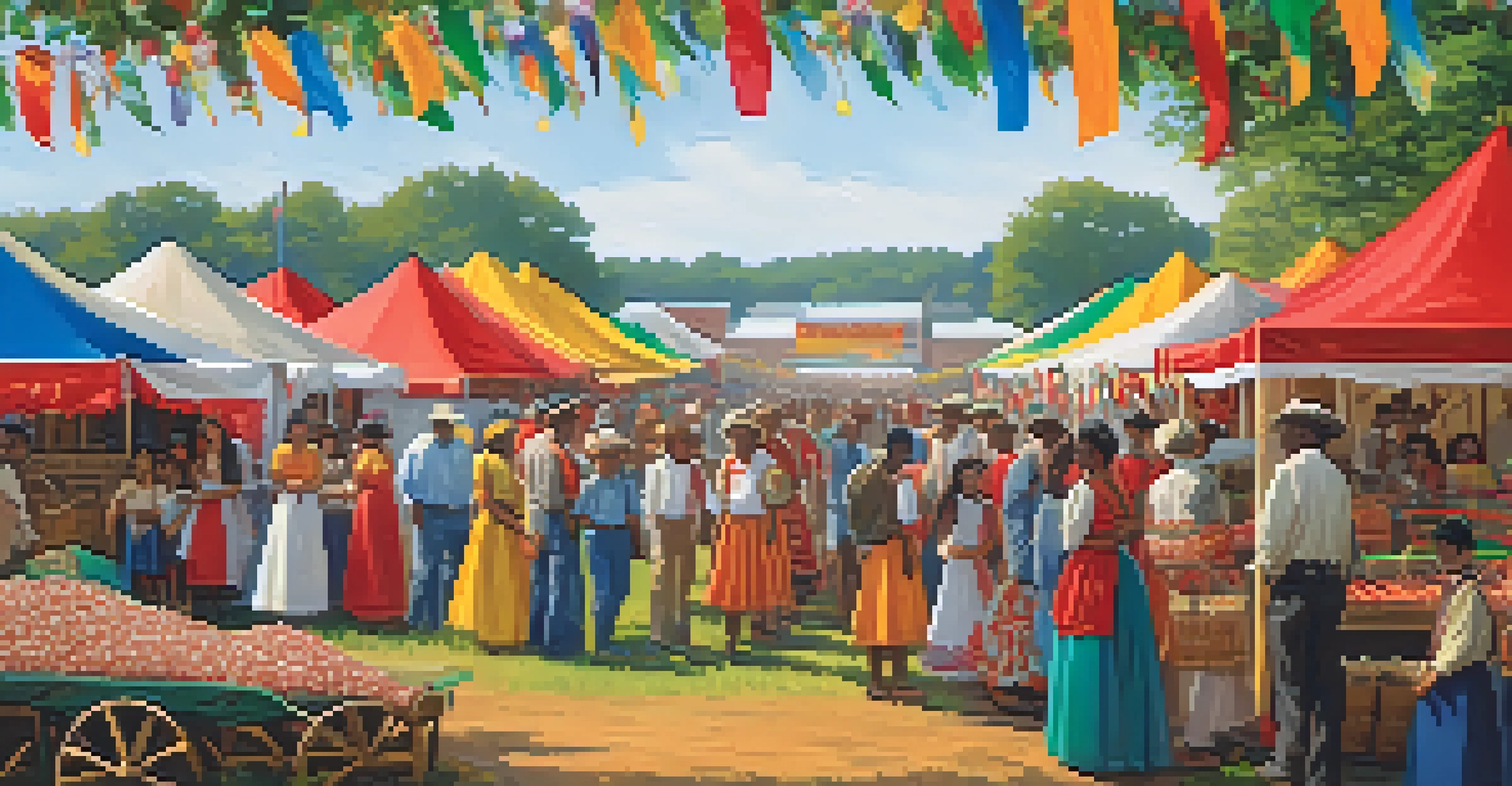The Significance of Cotton and Tobacco in NC Farming

Historical Overview of Cotton and Tobacco in NC
Cotton and tobacco have deep roots in North Carolina's agricultural history, dating back to the colonial era. Initially introduced as cash crops, they played a crucial role in the state's economy and development. The fertile soil and favorable climate of the region made it ideal for cultivating these crops, leading to their prominence in the 18th and 19th centuries.
Agriculture is the most healthful, most useful, and most noble employment of man.
As the demand for both cotton and tobacco grew, so did the number of farms dedicated to their production. This not only shaped the agricultural landscape but also influenced social and economic structures within communities. Many families relied on these crops for their livelihoods, creating a strong connection between farming and local identity.
However, the significance of these crops extends beyond just economics. They also reflect the cultural heritage of North Carolina, with traditions surrounding their cultivation and processing still celebrated today. Festivals and local events often highlight the importance of cotton and tobacco, reminding residents of their historical significance.
Economic Impact of Cotton Farming in NC
Cotton farming has historically been a backbone of North Carolina's economy, contributing significantly to both state and local revenues. The crop's versatility allows for various products, from clothing to home textiles, ensuring sustained demand. This economic impact can be seen in the growth of related industries, such as textile manufacturing.

In recent years, the cotton industry has adapted to changing market conditions, incorporating innovative farming techniques and sustainable practices. Farmers have begun using precision agriculture to optimize yield and reduce environmental impact. This not only helps in maintaining profitability but also aligns with the growing consumer demand for sustainable products.
Cotton and Tobacco's Economic Impact
Cotton and tobacco farming significantly contribute to North Carolina's economy through job creation and supporting related industries.
Moreover, cotton farming provides employment opportunities for many residents in rural areas. From planting to harvesting and processing, various jobs are created throughout the supply chain. This economic activity supports local communities and helps maintain the viability of farming as a way of life in North Carolina.
Tobacco Farming's Role in NC's Economy
Tobacco has long been a cornerstone of North Carolina's agricultural industry, once dominating the market as the leading cash crop. The state's unique climate and soil conditions create ideal growing environments, making it a top producer in the United States. The economic benefits derived from tobacco farming have been substantial, shaping the livelihoods of countless farmers and their families.
The future depends on what you do today.
Despite facing challenges due to changing regulations and public health perceptions, tobacco farming has evolved over the years. Farmers have diversified their practices, incorporating different varieties and adapting to a shifting marketplace. This adaptability ensures that tobacco continues to play a role in the state’s agricultural landscape.
Additionally, the tobacco industry supports a wide range of associated businesses, including processing and distribution. These connections further enhance its economic significance, providing jobs and supporting local economies. The legacy of tobacco farming in North Carolina remains a complex but important aspect of the state's agricultural identity.
Environmental Considerations in Cotton and Tobacco Farming
Both cotton and tobacco farming come with unique environmental considerations that farmers must navigate. Traditional farming methods can lead to soil depletion, pesticide use, and water management issues. However, many North Carolina farmers are increasingly adopting sustainable practices to mitigate these concerns.
For example, crop rotation and cover cropping are being utilized to enhance soil health and reduce dependency on chemical fertilizers. These sustainable practices not only benefit the environment but also improve crop resilience and yield. Farmers are recognizing that taking care of the land is essential for maintaining productive farming operations.
Cultural Heritage of Farming
These crops are integral to North Carolina's cultural identity, with festivals and traditions celebrating their historical significance.
Moreover, organizations and government programs are providing resources and assistance to promote environmentally friendly farming practices. By working together, farmers can ensure that cotton and tobacco farming remains viable for future generations while also protecting the natural resources of North Carolina.
Cultural Significance of Cotton and Tobacco in NC
Cotton and tobacco are more than just crops; they are integral to the culture and identity of many communities in North Carolina. Festivals celebrating these crops often feature traditional music, crafts, and food, showcasing the rich heritage associated with their cultivation. These events foster a sense of pride and connection among local residents.
Additionally, stories and folklore surrounding cotton and tobacco farming highlight the struggles and triumphs of previous generations. These narratives are passed down through families, creating a strong sense of continuity and belonging. They serve as reminders of the hard work and dedication that has shaped the agricultural landscape of the state.
The cultural significance of these crops also extends to art and literature, where they are often depicted as symbols of resilience and community. Artists and writers draw inspiration from the farming lifestyle, contributing to a broader understanding of North Carolina's agricultural heritage. This cultural tapestry enriches the state's identity and fosters appreciation for its farming traditions.
Challenges Facing Cotton and Tobacco Farmers
Despite their historical significance, cotton and tobacco farmers face numerous challenges in today's agricultural landscape. Fluctuating market prices, changing consumer preferences, and increasing regulations can create uncertainty for growers. This unpredictability makes it essential for farmers to remain adaptable and informed about industry trends.
Additionally, climate change poses a significant threat to traditional farming practices. Farmers are experiencing shifts in weather patterns, which can impact crop yields and quality. Addressing these challenges requires innovative solutions and support from both the agricultural community and policymakers.
Challenges and Future Adaptations
Farmers face challenges like market fluctuations and climate change, necessitating innovative practices and adaptability for future sustainability.
Finally, the ongoing stigma surrounding tobacco use has led to a decline in demand, prompting farmers to consider alternative crops or diversify their operations. This transition can be challenging, as it requires new skills and knowledge. However, many farmers are actively exploring sustainable options that align with current market trends while maintaining their agricultural roots.
The Future of Cotton and Tobacco Farming in NC
Looking ahead, the future of cotton and tobacco farming in North Carolina will likely be shaped by innovation and adaptability. As farmers face evolving market conditions and environmental challenges, embracing technology and sustainable practices will be crucial. This includes utilizing data analytics, precision agriculture, and eco-friendly farming methods.
Moreover, the importance of education and resources cannot be overstated. Extension programs and agricultural organizations can provide valuable training and support to farmers as they navigate these changes. Continuous learning will empower farmers to make informed decisions and adapt their practices to meet new demands.

Ultimately, the future of cotton and tobacco farming is intertwined with the broader narrative of North Carolina's agricultural heritage. By honoring their past while embracing change, farmers can ensure that these crops remain a vital part of the state's economy and culture for generations to come.